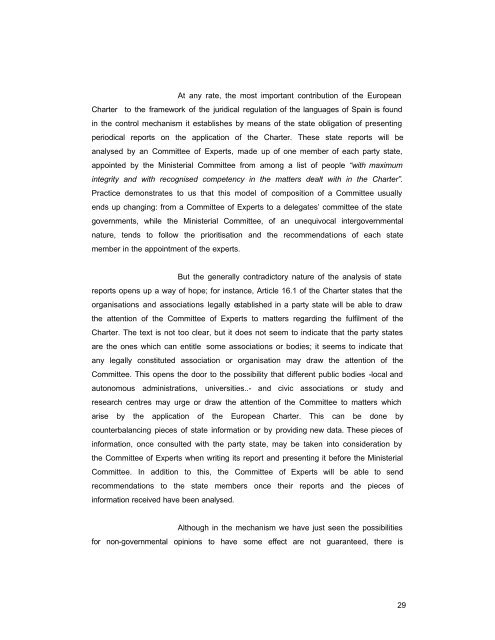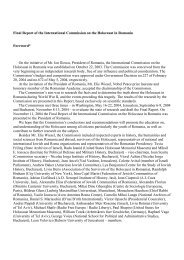get PDF document - MIRIS
get PDF document - MIRIS
get PDF document - MIRIS
You also want an ePaper? Increase the reach of your titles
YUMPU automatically turns print PDFs into web optimized ePapers that Google loves.
At any rate, the most important contribution of the European<br />
Charter to the framework of the juridical regulation of the languages of Spain is found<br />
in the control mechanism it establishes by means of the state obligation of presenting<br />
periodical reports on the application of the Charter. These state reports will be<br />
analysed by an Committee of Experts, made up of one member of each party state,<br />
appointed by the Ministerial Committee from among a list of people “with maximum<br />
integrity and with recognised competency in the matters dealt with in the Charter”.<br />
Practice demonstrates to us that this model of composition of a Committee usually<br />
ends up changing: from a Committee of Experts to a delegates’ committee of the state<br />
governments, while the Ministerial Committee, of an unequivocal intergovernmental<br />
nature, tends to follow the prioritisation and the recommendations of each state<br />
member in the appointment of the experts.<br />
But the generally contradictory nature of the analysis of state<br />
reports opens up a way of hope; for instance, Article 16.1 of the Charter states that the<br />
organisations and associations legally established in a party state will be able to draw<br />
the attention of the Committee of Experts to matters regarding the fulfilment of the<br />
Charter. The text is not too clear, but it does not seem to indicate that the party states<br />
are the ones which can entitle some associations or bodies; it seems to indicate that<br />
any legally constituted association or organisation may draw the attention of the<br />
Committee. This opens the door to the possibility that different public bodies -local and<br />
autonomous administrations, universities..- and civic associations or study and<br />
research centres may urge or draw the attention of the Committee to matters which<br />
arise by the application of the European Charter. This can be done by<br />
counterbalancing pieces of state information or by providing new data. These pieces of<br />
information, once consulted with the party state, may be taken into consideration by<br />
the Committee of Experts when writing its report and presenting it before the Ministerial<br />
Committee. In addition to this, the Committee of Experts will be able to send<br />
recommendations to the state members once their reports and the pieces of<br />
information received have been analysed.<br />
Although in the mechanism we have just seen the possibilities<br />
for non-governmental opinions to have some effect are not guaranteed, there is<br />
29












